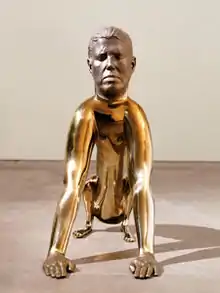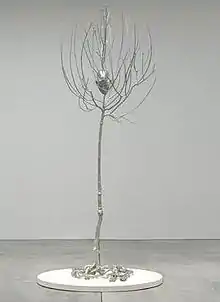Rona Pondick
Rona Pondick (born April 18, 1952) is an American sculptor. She lives and works in New York City.[1] Using the language of the body in her sculpture, in both a literal and a metaphorical sense, has been of interest to Pondick since the beginnings of her career in 1977.[2] An abiding concern of hers has been the exploration of the use of different materials, a consistent motif that runs throughout her work from its beginnings to the present day.[3]
Life
Raised in Brooklyn, New York, Rona Pondick earned her Bachelor of Fine Arts from Queens College in New York in 1974. She earned a Master of Fine Arts in 1977 from Yale University School of Art in New Haven, Connecticut, where she studied sculpture with David Von Schlegell, an American sculptor, and also studied with Richard Serra, who was a visiting artist in the program at the time.[1][4][5]
Pondick began to exhibit in galleries and museums in the mid 1980s, and since that time her sculpture and site-specific installations have been shown in exhibitions throughout the world.[6] Her work can be divided into two stylistic periods: early work based on fragments that reference the human body,[6] and later work centered around the human body as part of hybrid sculptures, merged with forms from nature of flora and fauna.[7]
Early Work: Fragments
Beginning with work from the early 1980s, Pondick has worked with fragments that invoke the body, including shoes, baby bottles, and teeth, “a quirky vocabulary of anatomical parts and body related objects that had some of Louise Bourgeois' oddity and near-surrealism and Philip Guston’s poignant, ambiguous symbolism.”[2][8] These early provocative works have included scatological references in bodily assemblages.[9] Her early work has been interpreted by critics in numerous ways, as a feminist critique of Freudian theories of sexuality, as an expression of infantile and juvenile desires,[6] and as “Freudian vaudeville acts designed to make you laugh until you feel something caught in your throat.”[10]
Her earliest sculptures are unmistakably scatalogical.[11] From the late 1980s to early 1990s, Pondick made sculptures of beds using pillows, cloth, and wood, some with baby bottles strapped to them with rope.[12]
Hybrid Sculptures: Animals/Flora and the Body
Beginning in 1998, Pondick began to make sculptures that merged parts of animals and flora with those of her own body, primarily casting them in bronze or stainless steel. Pondick merged traditional hand modeling with computer technology in order to create these hybrid sculptures, which incorporate depictions of her own head and hands.[13] For example, in her first work in the series, Dog (1998-2001), she combined a human head and hands with the body of a dog, creating a sphinx-like figure.[14][15] Other human-animal hybrids include Cat, Otter, Muskrat. Monkeys, and Ram's Head.[13][16][17] As Pondick stated, "I use the animal form because it is recognizable and holds its scale no matter where you put it."[5]

Hybrid Sculptures: Trees and the Body
In 1995, Pondick made her first sculpture of a tree using fruit scattered on the ground that incorporated human teeth.[18] Her first tree/human hybrid sculpture incorporated the artist’s miniaturized head as buds in the tree branches, using aluminum, bronze, and stainless steel. Her first tree/human hybrid sculpture was Pussy Willow Tree in 2001, commissioned by Fondation pour l’art contemporain Claudine et Jean-Marc Salomon in Annecy, France. This was followed by Cranbrook Art Museum’s commission of Crimson Queen Maple in 2003, and by Head in Tree, commissioned by Sonsbeek International in 2008 and installed in the center of a pond.[19]
Color
In 2018, Lynn Zelevansky wrote, “Color … enhances the informality and approachability of Pondick’s new work. Each object is named for the colors it contains. Her palette begins with the primary hues for photographic printing—magenta, cyan, and yellow—to which she adds green, blue, black, and white.[20] Made from resin, acrylic, and an epoxy modeling compound…they are each partly translucent and in places almost evanescent, changing as the light changes and as viewers move around them… The addition of color and the new materials significantly alter the visual impact and emotional tenor of Pondick’s art.” [21]

Artist's Technique
In her sculpture, Pondick has always used traditional methods such as carving, hand-modeling, mold-making, and metal casting, and at times, has used the latest in 3D computer technologies occasionally for modeling but largely for scaling.[22] This results in a mystery in the process, and it is often hard to discern how these objects are made.[11]
Awards and Grants
- 2016: Anonymous Was a Woman Award
- 2000: Cultural Department of the City of Salzburg, Kunstlerhaus
- 1999: Bogliasco Foundation Fellowship
- 1996: Rockefeller Foundation Fellowship
- 1992: Guggenheim Fellowship
- 1991: Mid-Atlantic Arts Grant
- 1988: Art Matters Inc., New York State Council on the Arts (for Beds installation), Artists Space Grant
- 1985: Ludwig Vogelstein Foundation Grant
- 1977: Fannie B. Pardee Prize in Sculpture
Solo Museum Exhibitions
This list includes material from Landau,[23] Stoops,[24] Van Der Zijpp,[25] Weiermair,[26] and Zaya.[27]
- 2017-18: Bates College Museum of Art, Lewiston, Maine
- 2017: Utah Museum of Contemporary Art, Salt Lake City, Utah
- 2010: Nassau County Museum of Art, Roslyn, New York
- 2009: Worcester Art Museum, Worcester, Massachusetts
- 2008 TR3, Ljubljana, Slovenia
- 2008 International Mozarteum Foundation (Die Internationale Stiftung Mozarteum), Salzburg, Austria
- 2004: Museum of Contemporary Art Cleveland, Cleveland, Ohio
- 2003: Cranbrook Art Museum, Bloomfield Hills, Michigan
- 2002: DeCordova Museum and Sculpture Park, Lincoln, Massachusetts
- 2002: Bologna Museum of Modern Art (MAMbo, or Museo d’Arte Moderna di Bologna), Bologna, Italy
- 2002: Groninger Museum, Groningen, Netherlands
- 1999: Rupertinum Museum für moderne und zeitgenössische Kunst, Salzburg, Austria
- 1999-97: Brooklyn Museum of Art, Brooklyn, New York
- 1995: Cincinnati Art Museum, Cincinnati, Ohio
- 1992: The Israel Museum, Jerusalem
- 1991: Beaver College of Art Gallery, Glenside, Pennsylvania
- 1989: The Institute of Contemporary Art, Boston, Massachusetts
- 1988: SculptureCenter, New York City
International Museum Exhibitions
Pondick's work has been included in international exhibitions including the Lyon,[28] Venice, and Johannesburg[29] Biennales, the Whitney Biennial,[30] and Sonsbeek.[31]
Museum Collections
Pondick's work is represented in museum collections including The Allen Memorial Art Museum[32] at Oberlin College, The Brooklyn Museum,[33] The Carnegie Museum of Art,[34] Centre Georges Pompidou,[35] Cleveland Museum of Art,[36] The DeCordova Museum and Sculpture Park,[37] The Fogg Art Museum/Harvard Art Museums,[38] The High Museum of Art,[39] The Los Angeles County Museum of Art (LACMA),[40] The Metropolitan Museum of Art,[41] The Museum of Contemporary Art, Los Angeles,[42] The Museum of Modern Art,[43] The Morgan Library and Museum,[44][39] The National Gallery of Art,[45] The New Orleans Museum of Art,[46] The New York Public Library,[39] The Rose Art Museum,[47] The Toledo Museum of Art,[48] The Whitney Museum,[49] and The Worcester Art Museum.[50]
Bibliography
- 2018 – Rona Pondick: Works 2013-2018. Marc Straus, New York; Zevitas Marcus, Los Angeles. ISBN 978-0692-14302-5.
- 2017 – Rona Pondick and Robert Feintuch: Head, Hands, Feet; Sleeping, Holding, Dreaming, Dying. Bates College Museum of Art, Lewiston, Maine. ISBN 978-0-9773570-3-1.
- 2009 – Rona Pondick: The Metamorphosis of an Object. Worcester Art Museum, Worcester, Massachusetts. ISBN 978-0-936042-20-6.
- 2008 – Rona Pondick: Works / Werke 1986-2008, New York, Salzburg. Internationale Sommerakademie fur Bildende Kunst, Salzburg; Galerie Thaddaeus Ropac, Paris / Salzburg; Sonnabend Gallery, New York. ISBN 978-3-901369-32-2.
- 2008 – Rona Pondick: Head in Tree and Other Works, 1999-2008. TR3, Ljubljana, Slovenia.
- 2004 – Rona Pondick: 1987-2001. Akira Ikeda Gallery, Taura, Japan.
- 2002 – Rona Pondick, Works 1986-2001. Sonnabend Press, New York. ISBN 0-9713411-1-7.
- 1992-1993 – Rona Pondick, Pink and Brown. The Israel Museum, Jerusalem. ISBN 965-278-114-2.
References
- Heller, Jules; Heller G., Nancy (1995). North American Women Artists of the Twentieth Century. New York, NY: Garland Publishing. ISBN 978-0815325840.
- MacAdam, Barbara A. (2010). "Self-Portrait as Muskrat, Monkey and Mouse". ARTnews (May): 95.
- "Worcester Art Museum". The Metamorphosis of an Object.
- Posner, Helaine. "Pondick, Rona." In Grove Art Online. Oxford Art Online, (accessed February 10, 2012; subscription required).
- Phong Bui (March 4, 2013), In Conversation, The Brooklyn Rail, retrieved 2013-07-22
- Koplos, Janet (September 2002). "Rona Pondick: Orchestrated Obsessions". Art in America: 114–119.
- Princenthal, Nancy (7 April 2002). "A Dreamlike Melding of Human, Beast, and Steel". The New York Times (Pages 33, 35).
- Posner, Helaine (2007). "Louise Bourgeois: Intensity and Influence". After the Revolution. Munich: Prestel. p. 45. ISBN 978-3-7913-3732-6.
- Schneider Adams, Laurie (1999). Art Across Time, Volume 2. Boston, MA: McGraw-Hill College. p. 934-934. ISBN 978-0697274809.
- Brenson, Michael (May 3, 1991). "Review/Art; Nicholas Africano Explores the Melding of Innocence and Experience". The New York Times.
- Stoops, Susan L. (2009). Rona Pondick: The Metamorphosis of an Object (Print ed.). Worcester, MA: Worcester Art Museum. pp. 11–27. ISBN 978-0936042206.
- Myers, Terry R. (December 1988). "Rona Pondick". Arts Magazine: 89.
- Johnson, Ken. (April 14, 2006) "Art in Review; Rona Pondick", The New York Times. Retrieved October 17, 2012.
- Lloyd, Ann Wilson. (November 13, 2009) "Rona Pondick", Art in America. Retrieved October 17, 2012.
- Princenthal, Nancy. (April 7, 2002) "Art/Architecture; A Dreamlike Melding Of Human, Beast and Steel", The New York Times. Retrieved October 17, 2012.
- Kaneda, Shirley (October 2009). "Rona Pondick", Bombsite. Retrieved October 17, 2012.
- Flannery, Maura C. (2003) "Biology & Art: An Intricate Relationship". The American Biology Teacher. 74:3. DOI: 10.1525/abt.2012.74.3.13. Retrieved October 17, 2012.
- Houston, Joe (2008). Rona Pondick: Works / Werke 1986-2008, New York, Salzburg. Salzburg: Internationale Sommerakademie für Bildende Kunst. ISBN 978-3-901369-32-2.
- MacAdam, Barbara A. (2008). Rona Pondick, Head in Tree and Other Works, 1999-2008. Ljubljana, Slovenia: TR3. pp. 15–17.
- Zelevanksy, Lynn (2018). Rona Pondick: Without Evasion or Compromise / Rona Pondick: Works 2013-2018. New York; Los Angeles: Marc Straus and Zevitas Marcus. p. 9. ISBN 978-0692-14302-5.
- Zelevanksy, Lynn (2018). Rona Pondick: Without Evasion or Compromise / Rona Pondick: Works 2013-2018. New York; Los Angeles: Marc Straus and Zevitas Marcus. p. 7. ISBN 978-0692-14302-5.
- Fitfield, George. "Rona Pondick: Lifelike, Unnatural, Hybrid Sculptures Address Questions of Fear and Desire". Art New England (221): 3, 75.
- Landau, Suzanne (1992). Pink and Brown (Print, Exhibition Catalog ed.). Jerusalem: Israel Museum.
- Stoops, Susan; Hart, Dakin; Princenthal, Nancy; Fitfield, George (2009). Rona Pondick: The Metamorphosis of an Object. Worcester, Massachusetts: Worcester Art Museum. ISBN 978-0-936042-20-6.
- Van Der Zijpp, Sue-an (2002). 'Beyond the Order of Things,' Rona Pondick (Print ed.). Sonnabend Press. pp. 4–5.
- Weiermair, Peter (2002). 'Considerations about the Work of Rona Pondick,' Rona Pondick (Print ed.). Sonnabend Press. pp. 7–10.
- Zaya, Octavio (2002). 'Rona Pondick: The Metamorphosis of an Object Maker: An Interview with Rona Pondick,' Rona Pondick (Print ed.). Sonnabend Press. pp. 111–139.
- Martin, Jean-Hubert (2000). 'Partage d'Exotismes,' 5eme Biennale d'art contemporain de Lyon (Exhibition Catalog. Print. ed.). Lyon, France: Lyon Biennale. pp. Volume 2, pages 32–33, 210.
- Enwezor, Okwui; Zaya, Octavio (Fall 1997). 'Trade Routes: History and Geography,' Second Johannesburg Biennale (Print ed.). Johannesburg Biennale. pp. 180–181.
- Armstrong, Richard; Hanhardt, John; Marshall, Richard; Phillips, Lisa (1991). 1991 Biennial Exhibition (Print ed.). Whitney Museum of Art in association with W.W. Norton & Company. pp. 210–2013.
- Tilroe, Anna (2008). 'Wisdom--Rona Pondick,' Sonsbeek 2008: Grandeur (Print ed.). Arnhem, Netherlands: Thieme Art, Deventer, Stichting Sonsbeek Internationaal. pp. 81–87, 262, 273.
- http://allenartcollection.oberlin.edu/emuseum/view/objects/asitem/id/6078
- http://www.brooklynmuseum.org/opencollection/artists/9249/Rona_Pondick
- http://www.cmoa.org/CollectionDetail.aspx?item=104324&retPrompt=Back+to+Results&retUrl=CollectionSearch.aspx%3Fsrch%3DPondick%252c%2BRona
- https://www.centrepompidou.fr/cpv/resource/cKxgBAG/rgjG57A
- https://www.clevelandart.org/art/2015.29?collection_search_query=dwarfed%20white%20jack&op=search&form_build_id=form-QQibLc97PlriY0qbf0r6MmuCgDffSKuhKD0e39GeE3c&form_id=clevelandart_collection_search_form&f[0]=field_images_field_large_image_url%3A1&c=1
- http://www.decordova.org/art/sculpture-park/otter
- http://www.harvardartmuseums.org/collections/object/191030?position=0
- http://www.iceditions.com/pondick-profile/
- http://collections.lacma.org/node/177844
- http://www.metmuseum.org/collection/the-collection-online/search/632276
- http://www.moca.org/museum/pc_artwork_detail.php?acsnum=94.12&keywords=pondick&x=-561&y=-503&
- http://www.moma.org/collection/browse_results.php?criteria=O%3AAD%3AE%3A7927&page_number=1&template_id=1&sort_order=1
- https://www.tumblr.com/tagged/the-morgan-library-&-museum
- http://www.nga.gov/content/ngaweb/Collection/art-object-page.126471.html
- http://noma.org/collection/detail/120/Monkeys
- http://rosecollection.brandeis.edu/THA2488?sid=25&x=4336
- http://www.ronapondick.com/assets/m_toledomuseum01.html
- http://collection.whitney.org/artist/4143/RonaPondick
- http://vqs61.v3.pair.com:8080/emuseum/view/people/asitem/P/429?t:state:flow=81a364e0-bc2c-48db-b586-83a102418ea2
External links
- Entry for Rona Pondick on the Union List of Artist Names
- Official site of the artist
- "Rona Pondick: The Metamorphosis of an Object"- 2009 exhibit at the Worcester Art Museum
- Rona Pondick in Conversation with Phong Bui (March 2013)
- 2009 Bomb Magazine interview of Rona Pondick by Shirley Kaneda
- The Artist Project, The Metropolitan Museum of Art: Rona Pondick on Egyptian sculptural fragments
- Neil, Jonathan. “A Conversation with Artist Rona Pondick.” Sotheby’s Institute of Art, YouTube, 31 January 2019